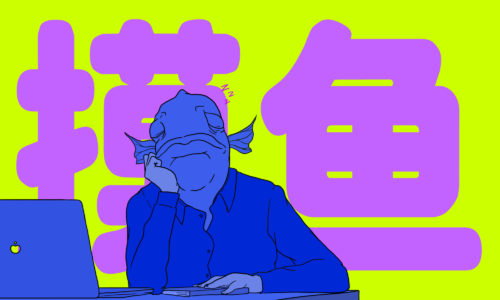Chinese celebrity apologizes for texting employees at all hours after social media backlash
A celebrity boss who overworks her employees has sparked another discussion on Chinese social media about the country’s severe lack of work life balance.

Chinese actress-turned-entrepreneur Zhāng Méng 张萌, who has more than 12 million followers on Weibo and runs a “media business,” has issued an apology after she appeared on a reality show revealing that she’s a difficult boss who regularly texts employees late at night and interrupts their sleep with tasks that need to be done urgently.
Her revelation and the backlash she faced on social media highlighted the ever-increasing demands of the modern workplace at a time when Chinese employees have been trying to change the culture after a number of deaths and suicides linked to overwork and job-related mental health issues.
Zhang made the controversial remarks on a dating show named “New Matchmaking Convention,” where she served as a special guest whose job was to comment on contestants and give them relationship advice. In an episode that aired on April 17, a single woman introduced herself as an “extreme night owl” with nontraditional sleep schedules. Once, she said, she didn’t sleep for more than 40 hours.
When the show’s host asked Zhang what she thought of the woman’s bedtime habits, the 40-year-old entrepreneur said that she also loved pulling all-nighters and even forced her employees to adopt her workaholic lifestyle.
“There were times when I found myself sending WeChat messages to my workers at 3 or 4 in the morning,” Zhang said, adding that while she had no problem if her employees didn’t respond immediately, she expected them to get back to her before 7 a.m. “Four hours have passed!” Zhang exclaimed, implying that there’s no such thing as personal time or overtime in her world — all of it is company time.
Zhang even mocked an unnamed employee for his supposed laziness. “Boss! I’m still sleeping at 7 a.m.!” Zhang stated, doing an impression of her disgruntled worker.
As the clip of Zhang’s comments circulated online, people on Chinese social media were quick to call her out for not respecting work-life boundaries and not allowing her employees to ever “turn off.” The strongest reactions came from those who understood the agony of Zhang’s employees on a personal level, who also had to deal with a boss as demanding as Zhang.
“As someone who faces a lot of pressure in the workplace, watching the video made my skin crawl,” a Weibo user wrote (in Chinese), while another said (in Chinese), “It boggles my mind that she’s shameless enough to share this on television.”
On Sunday, Zhang took to Weibo to address the backlash. “I will correct my behavior in the future. Thank you all internet users for the criticism,” she wrote briefly. The apology was seen by many as disingenuous and half-hearted. “I need to see a video of you apologizing to your employees in person!” a Weibo user commented (in Chinese) on her post.
Legally, China is committed to cultivating a healthy work-life balance. According to its labor law, employees should work no more than eight hours a day and 44 hours a week on average. It also stipulates that work can only be prolonged for at most one hour a day and overtime pay should be calculated at a rate of at least 150%.
But in reality, enforcement of the law is lax. To make the situation worse, the infamous “996 culture” — referring to 9 a.m. to 9 p.m., six days a week — which first took roots in the country’s tech sector, has pervaded all workplaces. Physical exhaustion and mental weariness have been normalized and are widely accepted by employees.
The obsession with work has led to tragedy. In December, an employee of Chinese ecommerce firm Pinduoduo collapsed on her way home after staying in the office until 1:30 a.m., and died following failed resuscitation attempts. Earlier this year, an engineer at Pinduoduo killed himself at home after experiencing what his family described as “a high level of pressure at work.” His suicide later prompted a former employee at Pinduodu to post a viral video, in which he described the “unreasonable policies” and “constant exploitation” of the company.
Incidents like these have highlighted the pressing problem with China’s overwork culture and placed the issue at the forefront of public consciousness, and there have been some legal victories for the overworked. In February, a computer engineer won a lawsuit against his former employer, a consulting firm in Shanghai, which fired him after he refused to answer work messages, emails, or phone calls while on vacation. And in an unprecedented move to prevent worker “burnout,” Shenzhen has passed a policy requiring local businesses to mandate paid annual leave for employees.






